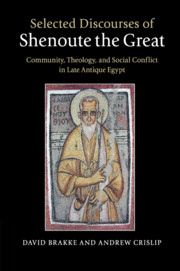 Selected Discourses of Shenoute the Great
Selected Discourses of Shenoute the Great Book contents
- Frontmatter
- Dedication
- Contents
- List of maps
- List of figures
- Acknowledgments
- Maps
- Introduction: Shenoute's life, times, and Discourses
- Part I Heretics and Other Enemies of the Church
- Part II Shenoute as Pastor and Preacher
- Part III The Christian's Struggle with Satan
- Part IV The Conflict with Gesios
- Bibliography
- Index of names
- Index of subjects
- Index of biblical passages
Part III - The Christian's Struggle with Satan
Published online by Cambridge University Press: 05 December 2015
- Frontmatter
- Dedication
- Contents
- List of maps
- List of figures
- Acknowledgments
- Maps
- Introduction: Shenoute's life, times, and Discourses
- Part I Heretics and Other Enemies of the Church
- Part II Shenoute as Pastor and Preacher
- Part III The Christian's Struggle with Satan
- Part IV The Conflict with Gesios
- Bibliography
- Index of names
- Index of subjects
- Index of biblical passages
Summary
Introduction
Ancient Christians understood their ethical life as a struggle not only against their own evil will and inclinations, but also against Satan and his demons. The author of Ephesians concluded his exhortations to righteous living in the Christian household by urging his readers to clothe themselves with God's armor and stand firm against the evil spirits: “For our struggle is not against enemies of blood and flesh, but against the rulers, against the authorities, against the cosmic powers of this present darkness, against the spiritual forces of evil in the heavenly places.” In the monastic literature from late ancient Egypt, demons frequently tempt monks with the pleasures of sin or try to shake their confidence in the providence of God. Evil spirits regularly appear in visual forms – for example, as wild animals, as seductive women, as black persons, or (deceitfully) as Christ or angels. But even more frequently they manifest as “thoughts” (logismoi) – insinuations of malice or doubt in the monk's mind that threaten to lead him into sin and away from fidelity to God. All Christians, whether they were monks or not, engaged in battle with the devil and evil spirits, but monks stood at the front line of that combat.
Shenoute likewise refers frequently to Satan and his demons throughout his writings. They deceive pagans into worshiping them, inspire heretics to oppose Christian truth, sow discord within the monastic community, tempt monks and lay people to sin, bring disease and other misfortunes upon everybody, and cause all manner of evil and suffering in the world. Such demonic activity occurs in all monastic literature. In contrast to his contemporaries, however, Shenoute tends to focus on Satan as the Christian's primary opponent. Shenoute certainly believes that Satan leads a multitude of demons, which afflict Christians in a variety of ways, but he most often speaks of the single great demon, Satan, who takes on a variety of forms in his relentless attacks on the Christian who tries to follow God and Christ.
The four works in this section take Satan and the Christian's struggle against him as their primary theme.
- Type
- Chapter
- Information
- Selected Discourses of Shenoute the GreatCommunity, Theology, and Social Conflict in Late Antique Egypt, pp. 157 - 162Publisher: Cambridge University PressPrint publication year: 2015


